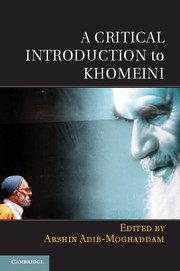Book contents
- Frontmatter
- Contents
- List of Map and Figures
- About the Authors
- Acknowledgments
- Glossary
- Timeline: The Life of Ayatollah Ruhollah Khomeini (1902–1989)
- Introduction Ayatollah Ruhollah Khomeini: A Clerical Revolutionary?
- 1 Khomeini and the “White Revolution”
- 2 The Rise of Khomeinism
- 3 Wilayat al-Faqih and the Meaning of Islamic Government
- 4 Ayatollah Khomeini’s Rule of the Guardian Jurist
- 5 Khatt-e Imam
- 6 Khomeini and the West
- 7 Gendered Khomeini
- 8 Hidden Khomeini
- 9 The Divine, the People, and the Faqih
- 10 Khomeini’s Legacy on Women’s Rights and Roles in the Islamic Republic of Iran
- 11 To Rule, or Not to Rule? An Alternative Look at the Political Life of Ayatollah Khomeini between 1960 and 1980
- 12 Khomeini and the Decolonization of the Political
- 13 Contentious Legacies of the Ayatollah
- Further Reading
- Index
- References
10 - Khomeini’s Legacy on Women’s Rights and Roles in the Islamic Republic of Iran
Published online by Cambridge University Press: 05 June 2014
- Frontmatter
- Contents
- List of Map and Figures
- About the Authors
- Acknowledgments
- Glossary
- Timeline: The Life of Ayatollah Ruhollah Khomeini (1902–1989)
- Introduction Ayatollah Ruhollah Khomeini: A Clerical Revolutionary?
- 1 Khomeini and the “White Revolution”
- 2 The Rise of Khomeinism
- 3 Wilayat al-Faqih and the Meaning of Islamic Government
- 4 Ayatollah Khomeini’s Rule of the Guardian Jurist
- 5 Khatt-e Imam
- 6 Khomeini and the West
- 7 Gendered Khomeini
- 8 Hidden Khomeini
- 9 The Divine, the People, and the Faqih
- 10 Khomeini’s Legacy on Women’s Rights and Roles in the Islamic Republic of Iran
- 11 To Rule, or Not to Rule? An Alternative Look at the Political Life of Ayatollah Khomeini between 1960 and 1980
- 12 Khomeini and the Decolonization of the Political
- 13 Contentious Legacies of the Ayatollah
- Further Reading
- Index
- References
Summary
In the summer of 2012, the Islamic Republic convened the first international conference on Women and the Islamic Awakening. Held in Tehran in early July, the two-day conference hosted female intellectuals and scholars from around the world. The Iranian press boasted the participation of more than 1,500 female researchers, scholars, and social activists from around 80 countries that participated in the conference and presented more than 450 papers.
Iran’s president, Mahmoud Ahmadinejad, delivered the inaugural speech at the opening ceremony of the two-day conference that included senior Iranian and foreign officials. In a live national television production on July 10, 2012, President Ahmadinejad addressed the convention hall; mostly assembled with women from the invited countries and senior Iranian officials. He began by asking why the role of women is so important in Islam, and what was meant by the term “awakening” in this context. He spoke of women’s unique capacities for loving kindness (mohebat), compassion (mehraboony), nurturing (tarbiat), providing help (komak), and respect (ehteram). He went on to say that women stood shoulder to shoulder with men, providing the seat of love and kindness (kanoon-e eshq o mohebat-e ensan). Commenting on the social and familial roles of women in this address, Ahmadinejad added: “Your assignment is a very heavy one” (Mamooreat-e shoma besseeyar sangeen ast). Indeed, he spoke about the broader goals of “reforming the world” (eslahe jahan shoddast), and continued to say that “just because it is a big job, do not think that you cannot achieve it.”
- Type
- Chapter
- Information
- A Critical Introduction to Khomeini , pp. 239 - 255Publisher: Cambridge University PressPrint publication year: 2014
References
- 2
- Cited by



